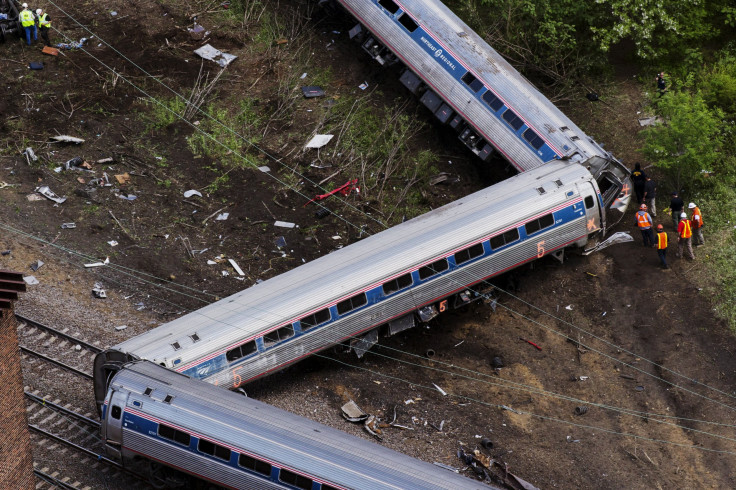Amtrak Ordered By FRA To Modify Signal System To Avoid Speeding At Sharp Curves: Report

The Federal Railroad Administration (FRA) has reportedly ordered Amtrak to modify its existing signal system to prevent speeding at sharp curves on the Northeast Corridor, where the Northeast Regional Train 188 derailed on Tuesday, killing eight people and injuring over 200. Investigators say that the Northeast Regional Train was traveling over twice the speed limit and derailed while negotiating a sharp turn in Philadelphia.
Amtrak is now set to change its current automatic braking system to prevent the trains from speeding at the curving section of northbound track where the train heading north to New York with 238 passengers and five crew members, derailed, the Wall Street Journal reported, citing sources. The existing system -- used by Amtrak and others -- sets off an alarm if the train exceeds the speed limit and cuts off power to the trains that do not slow down. However, such track circuits were protecting the southbound trains, and not the northbound ones.
In an interview to CNN on Friday, FRA’s Acting Administrator Sarah Feinberg had asked Amtrak to install a protective circuit in Philadelphia before the service in the area restarts. Amtrak is likely to follow the FRA’s instructions, which might to be announced Saturday, the Journal reported.
A source told the Journal that Amtrak was identifying areas in the railroad territory that may need greater protection, including sharp turns to Wilmington, Delaware, the way to a rail bridge at Pelham Bay in the Bronx section of New York City, and a pair of S-curves in Baltimore, Maryland. These tracks have not yet been covered by the advanced system called the positive train control, which helps avoid human error.
While the U.S. government is trying to push for an year-end deadline for the installation of the advanced systems, not all trains may be able to do so. However, Joseph Boardman, Amtrak’s president and CEO, told the Journal, that his company will be able to meet the deadline.
As a detailed investigation continues into the crash, the FBI is also probing if the train was hit by a projectile. The investigators will examine the front of the train and will review the radio transmissions.
Robert Sumwalt, a spokesman for the National Transportation Safety Board (NTSB), reportedly said that three people were interviewed by investigators. One conductor had told the investigators that she overheard a radio conversation between the train’s engineer Brandon Bastion and a local engineer, moments before the crash, in which Bastion said he thought his train was struck by something. Bastion, however, did not mention the alleged radio conversation during his interview with investigators.
Authorities from NTSB, however, said that Bastion has been “extremely cooperative” in the investigation and added that because he faced a concussion, he does not recollect the events of the night.
© Copyright IBTimes 2025. All rights reserved.






















